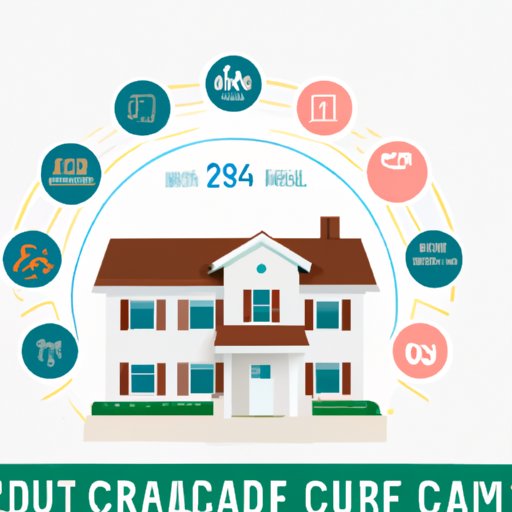Introduction
Buying a home is one of the biggest financial decisions you can make. It requires careful preparation and planning to ensure success. In this article, we’ll explore the steps you need to take to financially prepare to buy a home, including developing a budget, checking your credit score, saving for a down payment, researching mortgage options, and more.

Develop a Budget and Stick to It
Creating a budget is the first step in any successful financial plan. A budget helps you keep track of your income, expenses, and savings goals. To develop a budget, start by tracking your income and expenses for several months. This will give you an idea of how much money you have available to put towards a home purchase. Once you have a clear picture of your finances, you can create a budget that works for you. Set realistic goals for spending and saving, and stick to them as closely as possible. Budgeting will help you stay on top of your finances and save up for a down payment.
Check Your Credit Score and Take Steps to Improve It, If Necessary
Your credit score is one of the most important factors in determining the interest rate you receive on a loan. The higher your credit score, the lower the interest rate you may be eligible for. Before applying for a mortgage, it’s a good idea to check your credit score and take steps to improve it, if necessary. You can get a free copy of your credit report from each of the three major credit bureaus once per year. Review your report for accuracy and identify any areas that need improvement. You can also work to improve your credit score by making payments on time, paying off debt, and avoiding taking on new debt.
Save for a Down Payment
Most lenders require borrowers to make a down payment when buying a home. The size of the down payment required depends on the type of loan you are applying for. Generally, the larger the down payment, the lower the interest rate you may be eligible for. There are different types of down payments, such as cash, gift funds, and other forms of collateral. No matter which type of down payment you choose to use, it’s important to start saving early. Set aside a portion of your income each month and make it a priority to save for a down payment.

Research Mortgage Options and Shop Around for the Best Deal
Once you’ve saved up for a down payment, it’s time to start researching mortgage options. Different types of mortgages, such as fixed-rate and adjustable-rate mortgages, offer different benefits and drawbacks. Consider factors such as the length of the loan, the interest rate, and the fees associated with the loan before deciding which option is best for you. Also, shop around to find the best deal. Compare rates from multiple lenders to ensure you get the most favorable terms.

Consider Additional Costs Associated with Buying a Home
When preparing to buy a home, it’s important to consider all of the costs associated with the purchase. Closing costs, such as appraisal fees, title insurance, and attorney’s fees, are typically paid at the time of closing. Additionally, there are ongoing maintenance costs to consider, such as repairs, property taxes, and homeowner’s insurance. Make sure you factor these costs into your budget when calculating how much house you can afford.
Get Pre-Approved for a Loan
Getting pre-approved for a loan is another important step in the home-buying process. Pre-approval gives you an idea of how much you can borrow and what kind of interest rate you may qualify for. Lenders typically look at your credit score, employment history, and income when evaluating your application for pre-approval. Having a pre-approval letter in hand will also show sellers that you are serious about buying a home.
Conclusion
Buying a home is a major financial decision that requires careful preparation. Developing a budget and sticking to it, checking your credit score and taking steps to improve it, saving for a down payment, researching mortgage options, and getting pre-approved for a loan are all essential steps in the process. By taking the time to plan ahead and prepare your finances, you can increase your chances of finding the right home at the right price.
(Note: Is this article not meeting your expectations? Do you have knowledge or insights to share? Unlock new opportunities and expand your reach by joining our authors team. Click Registration to join us and share your expertise with our readers.)
